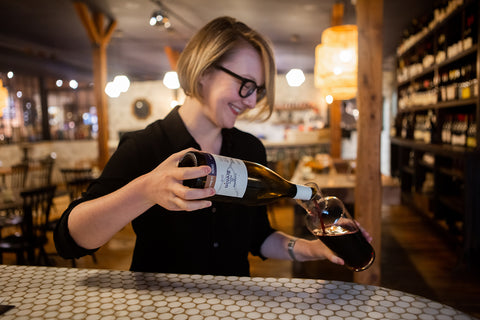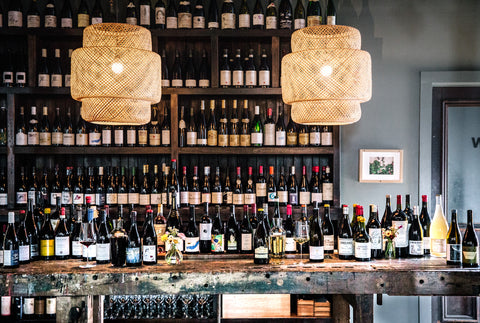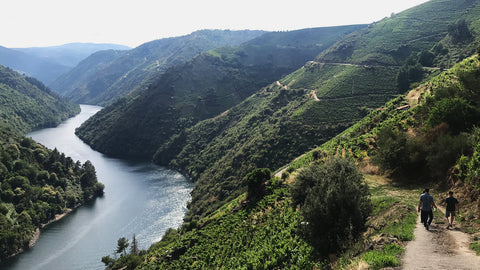When I first started drinking natural wine, I was constantly reaching for bottles that were funky, wild, and a little barnyard-y. At the time I thought of natural wine as a style or category, like rosé or French wine. Skittles hued bottles littered my Instagram feed. Sourcing and drinking these bottles felt like collecting Pokémon cards. They had unique aromas, playful crown caps, and vibrant eye-catching labels. I thought this was the brand of natural wine.
“Natural wine is a way of life, and there’s no going back.” - Tim Gagnon, natural wine importer Selection Massale
Over years spent drinking, talking, and working with natural winemakers and natural wine importers, I have been fortunate to be a part of many discussions — and debates — about natural wine.
Currently, there is no regulated definition for “natural wine.” This is why the conversation surrounding who is and who is not natural is so contentious and nuanced. We can generally agree on some basic principles though — wine farmed without chemicals and made with indigenous yeast — but can get caught up in the myriad other details of what goes into making wine.
At Dedalus, we work with winemakers who are passionate about creating the best wine possible that speaks to the land in which it was created. And almost all of those winemakers are using native yeasts and organic or biodynamic farming practices.
In our work with them, we have developed some core beliefs around the wine that we choose to carry and share with people. And we want to share those values with you:
-
Natural wine is made by farmers. It is born out of tenacity and humility of working with an ever-changing landscape. The grapes are farmed using sustainable practices and harvested by hand. In this way, natural wine is a reflection of the land where the grapes are grown and the people who created it.
-
Natural wine is not a flavor — it can be wild but it can also be as classic as it comes.
-
Natural wine is not new. It is a return to traditional methods of farming and making wine. It is the most honest translation of the land and one that we’re happy to see returning.
Natural wine is made by farmers.
When you visit a natural winemaker, you spend more time touring the vineyard than you do the winery. The land, the terroir, is the most important element in natural winemaking.
Terroir means the taste of place. It refers to the physical environment in which the grapes were grown, from the soil and weather patterns to the nearby river or dramatic mountainous terrain.
All of these elements of the natural landscape have a tangible effect on the wine. A terroir-driven wine is a wine that is reflective of where it was made. This can be specific to a wine region, vineyard site, or even a single row of vines. And, no two places have the same terroir.
For natural winemakers, honoring terroir is achieved through a deep connection to the natural environment. The French have a word for this: vigneron. A vigneron is someone who is a winemaker and a farmer. The person in the cellar is also out in the field. In some ways, vignerons can be thought of as farmers who make wine. This type of person is also called a wine grower or wine farmer.

Vignerons believe that great wine is made in the vineyard. They spend hours walking in the vineyards, getting to know their vines, and tending to the landscape, even in the most challenging environments. Pedro Rodríguez of Guímaro works majestic old-vine vineyards in Ribeira Sacra, Spain by hand. This ancient Galician terrain is so steep that ladders are built into the rocky hillside to allow for safe(r) movement around the terraced vineyards. In some places, flat outward-jutting rocks are used as steps.
It takes a certain amount of dedication to grow vines in demanding landscapes — maybe that’s why many vignerons joke that their vines are like their children. They’ve seen their vines grow, struggle and thrive. They’ve seen them through poor vintages and exceptional harvests. And, they worry about their vines' livelihood all the time. Giulia Negri, a young winemaker in Piedmont, once told me, “I love my vines more than I love myself!”
As with children, sometimes that means letting the vines be who they are. The world’s greatest winemakers, like Guillaume D’Angerville, Christophe Roumier, and Jeremy Seysses (Domaine Dujac) in Burgundy, France, have learned that the best way to capture terroir is to get out of the way of terroir. Let nature do the talking. The less intervention the better - that is certainly not to say less work. It takes a certain degree of faith, fortitude and experience to choose to farm your vineyards organically and still consistently produce exceptional wine.
This choice to farm organically or biodynamically allows winemakers to highlight, honor, and preserve their terroir. Organic and biodynamic agriculture describes farming without the use of synthetic chemicals — like herbicides, pesticides, fungicides, or fertilizers — that most commercial farming relies on.
Everything is done by hand. Little machinery is involved. Biodiversity in the vineyard is paramount. And, once the grapes are brought into the winery, every step that follows aims to preserve what happened in the vineyard.
In Champagne, Benoît Lahaye encourages native grasses to grow in between the vines, uses only organic compost and manure to fertilize the vineyards, and utilizes draft horses instead of machinery to aerate and maintain the healthy ecosystem of the soil at his small domaine.
In Faugères, in southern France, Didier Barral (Leon Barral) is famous for his attention to detail in the vineyard and sustainable farming techniques. He is a mentor and innovator in the way of biodynamic farming.
A pioneer of regenerative agriculture in the US, Nate Ready of Hiyu Wine Farm in Oregon, works fervently to reverse climate change by farming in a way that restores soil, prevents erosion, enhances biodiversity, and improves regional water quality. All of this effort translates to healthy vines which means high-quality, natural wine.
“Natural wine is super important. It’s our connection to the people who are farming in the best way possible, really taking care of the land, growing grapes in a super conscientious way, and then making wine where there is nothing added and nothing removed. Just those grapes, just all that work in the vineyard.” - Vanya Filipovic, natural wine importer, Les Vins Dame-Jeanne, and owner of natural wine bar Vin Mon Lapin in Montreal
Natural wine is not a flavor.
As consumers, and especially as wine professionals, we have a tendency to obsess over this. We discuss aroma and flavor, and often use these descriptions to define a wine. This is great — this is how we understand wine, and how we enjoy it. But when it comes to natural wine, there’s a tendency to rely on specific descriptors: to put it in a box. It’s important to recognize that natural wine should not be associated with a specific flavor profile.
“Natural wine is made by people working to clean up the signal between the vineyard and the wine drinker.” - Jason Zuliani, owner of Dedalus Wine
This is because natural wine is a philosophy, not a style. Since most natural winemakers implement organic or biodynamic methods into their farming practices, it is no surprise that similar approaches are applied at the winery. There, natural winemakers avoid any use of synthetic chemical treatments or additives — a common practice in commercial wineries. Basically, they do as little as possible to manipulate the wine. We call this low-intervention winemaking.
If there’s anything that we can agree on in the definition of natural wine, it’s that it is made with spontaneous fermentation by native yeast. This means the winemaker uses native yeast that develops in the vineyard (and naturally lives on the grape skin) along with the natural sugars in the grape juice to initiate alcoholic fermentation. The winemaker allows this fermentation to occur at its own pace without the aid of temperature control or the inoculation of commercial yeast.
The majority of wine sold in the US is made with the use of commercially-produced yeast. Natural winemakers believe that native yeast adds a unique character and a sense of place to the wine. It is an element of terroir. The use of native yeast is essential to making natural wine, and is the common thread that runs through all natural wines.
Almost all of the wines we carry at Dedalus Wine use native yeast. After the fermentation completes, the wines may skip fining and filtering (which is why some wines appear cloudy) and are bottled with little to no added sulfur dioxide, also known as sulfites.
“Natural wine is fermented grapes that haven’t been messed with. It’s the purest and most authentic expression of place achievable in wine. And, when it’s done right, it’s also the most delicious.” - Anthony Lynch, wine importer Kermit Lynch Wine Merchant
But, why are some wines made naturally described as funky? Some practices associated with low-intervention winemaking, like the lack of added sulfur dioxide, the absence of filtering, and fermentations featuring native yeast, may create wild, earthy, boiled egg-y and animal-like aromas.
Sometimes, these are considered flaws. Sometimes, they are desirable in small quantities. What’s important to know is that “funky” is not a universal descriptor that can be applied to natural wines. For as many brightly colored, earthy, cloudy bottles you find, you’ll find just as many refined, elegant, and impeccably balanced bottles of natural wine.
Natural wine is not new.
Natural wine has been made for thousands of years. The methods for making what we call “natural” wine today were just the norm for winemakers a few hundred years ago. The reason we’re talking about it, and drinking it now, is that for the first time in a while, it’s cool again. And a new generation of winemakers is educated and empowered to make sustainably-raised wines.
Every natural winemaker has a story. Some natural winemakers are on a multi-generational quest to produce the best wines representative of their family’s land, while others try to push boundaries and discover new ways of doing things. No matter their background, natural winemakers’ stories all have something in common: they all look to the past for inspiration.
Take Danilo Marcucci of Conestabile della Staffa in Umbria, Italy. He calls himself a wine farmer, and works tirelessly to help local winemakers restore vineyards and resurrect ancient methods in their regions. He travels to different places in Italy, researching each village terroir, asking, “What grapes grew here? What was the method for caring for the vines? What type of vessel was used to hold the fermentation or age the wine?” His efforts rescue culture. The work done by these natural winemakers also allows us to travel back in time a bit.
“Natural wine is the courage of honest people to embrace the unpredictability of the natural world, and to simultaneously both honor the past and also carve out a meaningful and more delicious future for them and their community.” - James Hull, natural wine importer SelectioNaturel
But why did those methods fall out of favor in the first place? Post World War II, chemicals were seen as the answer to scarcity. Producing large quantities of produce with less work was seen as a great victory. Technology brought modern techniques, and the mechanization of farming created distance between the farmer and their vines. Vintage variation and terroir were traded for consistency and homogeneous wine.
The search for homogeneity was furthered by the use of additives. Additives are certainly not new in winemaking history — the Romans pioneered the use of sulfites and the Greeks were no strangers to mixing their wines with herbs and even seawater to alter the flavor — but what is new is the amount of control commercial additives have given winemakers. There are additives for enhancing tannin, acidity, and color, additives that stop fermentation early or start it again, or that can help remove unwanted particles from the wine. (Egg whites, anyone?) The additives in play today give winemakers the ability to make a wine from California taste like a wine from France — to fundamentally alter, even obliterate, its terroir.
This new, commercial way of farming and making wine didn’t go uncontested. Visionaries, like Jules Chauvet (who is considered the “French father of natural wine”) and Jacques Néauport, challenged these new norms. Their work advocating for a return-to-the-land approach inspired a generation of curious and passionate growers, like Marcel Lapierre and the Gang of Four in Beaujolais.
“Natural wine is a community of idealists trying to resurface history. It is a swirl of ideas and questions, and it is beautiful, and totally worth exploring.” - Jason Zuliani, owner of Dedalus Wine
The resistance to the industrialization of wine has gifted us a generation of natural winemakers who are bent on creating incredible wines responsibly. People like Luis Rodriguez in Galicia, Spain; Envínate on the Canary Islands; Thierry Germain in the Loire Valley; Christian Tschida in Austria; Jean Charles Abbatucci in Corsica, and Saša Radikon in Friuli, Italy, and Slovenia, are protecting wine’s cultural diversity by restoring forgotten and malnourished vineyards, resurrecting ancient wine styles, reviving neglected native grape varieties, mentoring neighboring winemakers, and, ultimately, rescuing lesser-known wine regions from extinction.



